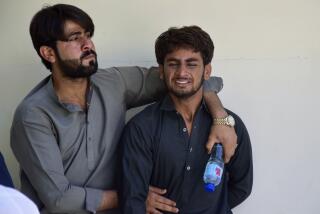Video of Taliban flogging girl draws anger in Pakistan
Face down before a crowd, the teenage girl shrieks and writhes, begging for mercy. But the three masked men holding her down merely tighten their grip while a fourth man whips her again and again.
The video of a 17-year-old girl being publicly flogged by the Pakistani Taliban in the Swat Valley has galvanized the nation, drawing protests from human rights groups, denunciations from the central government and expressions of revulsion from many Pakistanis.
The video, shot this year, surfaced Friday on Pakistani television stations and the Internet.
Reports of abusive acts by the Pakistani Taliban have filtered out of the northwestern valley for months, but such brutal scenes are rarely captured on camera and publicly aired.
“This is intolerable,” prominent human rights activist Asma Jahangir told journalists in the eastern city of Lahore.
Jahangir said the girl was believed to have been punished after refusing to marry a Taliban commander in the Swat Valley, where the government in February struck a truce with Islamic militants to stem violence. The militants then accused her of immoral behavior and ordered 34 lashes, Pakistani news reports said.
The video, shot with a cellphone, initially shows the girl, clad in an all-enveloping black burka, being held by men while another begins striking her. She can be heard shouting for help in the Pashto language, spoken by most people in Swat. She is then dragged to another location, held down and flogged. Several dozen people can be seen watching.
“For God’s sake, please stop, stop it,” the girl pleads as the whip falls. “I am dying.”
Off-camera, another militant gives orders: “Hold her feet tightly. Lift her burka a bit.”
A Taliban spokesman, Muslim Khan, defended the public lashing, saying the girl had engaged in immoral behavior, but did not specify. “It happened two months ago, when we were at war with the government,” he told reporters in Swat. But area residents said the incident had taken place two weeks ago in the village of Kala Kalae.
President Asif Ali Zardari and Prime Minister Yusaf Raza Gillani condemned the flogging and pledged an investigation. The government’s former information minister, Sherry Rehman, requested a special session of parliament to discuss the incident.
“Such brutalities . . . cannot be allowed to take place under the leadership of a democratic government,” Rehman said in a statement. “We cannot leave our citizens at the mercy of militants who are murdering and maiming our people in the name of Islam.”
Under the February truce, the Taliban were to cease hostilities and in return the provincial government permitted them to set up Islamic courts to enforce their version of Sharia law.
Jahangir, head of the Human Rights Commission of Pakistan, called the flogging a harbinger that the country and its leaders must heed.
“This is not just the flogging of the girl; it is an indication of what is in store for us,” she said. “The Taliban are forcing their brand of Islam on us, and we have to resist that.”
Despite widespread condemnations, some Pakistani religious leaders defended the public whipping.
“The flogging is Islamic, and the punishment is written in the holy Koran,” a leading Muslim scholar, Mufti Munibur Rehman, said in a televised debate. “So how can we term it un-Islamic?”
Other influential religious figures, though, denounced the punishment. Amir Liaquat Ali, who hosts a popular Islam-themed program on Geo TV, called it barbaric.
Some provincial officials complained that it was unfair to portray the flogging as reflecting current conditions in Swat, 100 miles north of Islamabad, the capital.
TV stations that aired the video preceded it with a warning that it contained graphic imagery and children should not be allowed to view it. Word of it quickly spread, with horrified Pakistanis from across the social spectrum text-messaging friends and urging them to watch it.
The Swat accord was reached between the North-West Frontier Province government and a cleric named Sufi Muhammad, whose son-in-law Maulana Qazi Fazlullah leads a Taliban army that for nearly two years held off army and paramilitary troops seeking to regain control of Swat.
The alpine valley was once a tourist haven, with stunning mountain scenery and a ski resort, which the militants burned down.
Over the last two years, they also burned down nearly 200 schools that provided education to girls and beheaded dozens of local officials and paramilitary troops, terrorizing anyone who dared speak against them.
The central government was not a party to the peace accord but signaled its approval and pulled back army troops. The Swat deal was viewed with concern by Western governments, but Pakistani officials defended it as a way of stemming bloodshed in Swat and said the brand of Islamic law to be imposed was not a particularly harsh one.
The video was reportedly obtained by a documentary filmmaker named Samar Minallah, who said she received it from friends in Swat. It had been circulating in the valley for days, she said.
--
Zaidi is a special correspondent. Special correspondent Zulfiqar Ali in the city of Peshawar contributed to this report.
More to Read
Sign up for Essential California
The most important California stories and recommendations in your inbox every morning.
You may occasionally receive promotional content from the Los Angeles Times.










